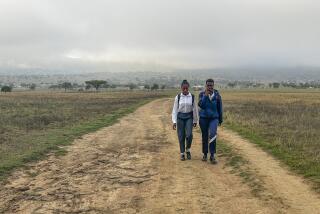S. Africa Plans School, Housing Aid for Embattled Area
- Share via
JOHANNESBURG, South Africa — In its biggest effort yet to improve black living standards, the South African government announced plans Monday for more than $550 million in new housing, schools and other community facilities in strife-torn Natal province.
Gerrit Viljoen, minister of education and development aid, said the 5-year project will ease the severe housing shortage around Durban, Pietermaritzburg and other Natal cities, which have become the focus of most of the country’s political violence, and at the same time create thousands of new jobs.
Viljoen said that plans include entire new communities to relieve the crowded black townships around the cities and sites for 83,400 new houses that are to be financed separately by the South African Housing Trust, which operates with government funds, or by private developers.
The project will be financed in large part by the government’s planned sale of more than $30 billion in state assets, among them the national airline, the country’s major electric-power utility, its largest steel company and other industrial firms, in a privatization program that will “redeploy” capital to meet urgent social needs.
Viljoen described the Natal plan as the government’s largest, most concentrated effort yet to improve the living standards of the country’s black majority. As such, it is a key part of Pretoria’s broader strategy to reduce political discontent by dealing directly with such grievances as massive unemployment, an immense housing shortage, a lack of basic public services and poor-quality education.
Although drafted over the last three years, the project was announced in Cape Town on Monday with the hope that the promised improvement in black living standards will help reduce the bitter political feuding that has affected much of Natal, particularly the Durban and Pietermaritzburg areas, for the past year.
More than 400 people have been killed in clashes between supporters of Inkatha, a predominantly Zulu political movement led by Chief Mangosuthu Gatsha Buthelezi, and those of the more militant United Democratic Front, a coalition of 750 anti-apartheid groups.
As chief minister of Kwazulu, the Zulu tribal homeland, which will administer about half of the project, Buthelezi could win further support for his politically moderate position, which favors gradual reform, participation in the government and a negotiated resolution of the country’s continuing crisis.
Viljoen, who oversees the black school system, told a press conference in Cape Town that scores of schools will be built and opened as fast as they can be built.
More to Read
Sign up for Essential California
The most important California stories and recommendations in your inbox every morning.
You may occasionally receive promotional content from the Los Angeles Times.













